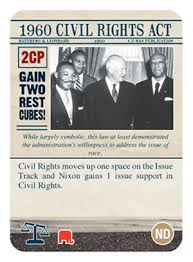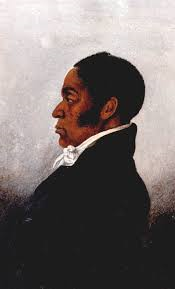
President Eisenhower signed Civil Rights Act of 1960. The Civil Rights Act of 1960 (Pub.L. 86–449, 74 Stat. 89, enacted May 6, 1960) was a United States federal law that established federal inspection of local voter registration polls and introduced penalties for anyone who obstructed someone’s attempt to register to vote or someone’s attempt to actually vote.
The Civil Rights Act of 1960 was the first civil rights bill to be approved by Congress since Reconstruction. Although Eisenhower was not routinely linked to the civil rights issue, his contribution, was important as it pushed the whole civil rights issue into the White House. At the time, politicians from the South were angry over what they saw as federal interference in state affairs. The bill became an act in 1960 as both parties were fighting for the “Black Vote.” The Eisenhower civil rights acts added only an extra 3% Black voters to the electoral roll for the 1960 election.
While the act barely touched on anything new and Eisenhower, at the end of his presidency, was accused of passing the thorny problem of voters’ constitutional rights over to his successor. Though the act did little to impress civil rights leaders, they realizedthat it was the federal government’s recognition that a constitutional problem existed.

On May 5, 1886, African American inventor M.A. Cherry was granted a U.S. patent for an improved design of the tricycle. His innovation featured a frame that was more stable and practical for transportation, especially suited to the needs of the time. While much of Cherry’s personal background remains obscure, his contribution reflects the often-overlooked role of Black inventors during the post-Reconstruction era—a time when innovation by African Americans was rarely recognized or widely celebrated. Cherry’s patent is part of the rich legacy of Black ingenuity that helped shape everyday life in America.
On May 5, 1985, Gladys Merritt Ross, an influential African American educator and co-founder of the Phi Delta Kappa sorority for Black women educators, passed away in Stockton, California. Founded in 1923, Phi Delta Kappa was established to support and uplift African American women in the teaching profession during a time when their presence in educational leadership was heavily marginalized. Ross dedicated her life to advancing excellence in education and community service, mentoring generations of Black educators and promoting academic achievement in underserved communities. Her legacy lives on in the continued mission of the sorority she helped build.
On May 6, 1931, baseball icon Willie Howard Mays Jr. was born in Westfield, Alabama. Widely regarded as one of the greatest all-around players in Major League Baseball history, Mays captivated fans with his powerful bat, blazing speed, and jaw-dropping defense. Nicknamed “The Say Hey Kid,” he played for both the New York and San Francisco Giants, amassing 660 career home runs. A two-time National League MVP and 24-time All-Star, Mays also won 12 Gold Glove Awards and was a four-time National League batting champion. His legacy transcends statistics — he remains a symbol of excellence, grace, and resilience in American sports.
On May 6, 1812, Martin Robison Delany was born free in Charles Town, Virginia (now West Virginia). A visionary intellectual, physician, and one of the first African Americans admitted to Harvard Medical School, Delany was a leading figure in the 19th-century Black nationalist movement. He advocated for African American pride, self-determination, and even African repatriation long before these ideas entered the mainstream. As co-editor of The North Star with Frederick Douglass and a Union Army officer during the Civil War, Delany embodied the fusion of scholarship, activism, and military service. His legacy laid critical groundwork for future Pan-Africanist and Black empowerment ideologies.
On May 6, 1787, African Lodge No. 459 was officially organized in Boston under the leadership of Prince Hall, a free Black man and prominent abolitionist. Hall had previously petitioned for a Masonic charter from the Grand Lodge of England after being denied membership by white American lodges. The approval made African Lodge No. 459 the first official Black Masonic lodge in the United States. Prince Hall’s leadership laid the foundation for Prince Hall Freemasonry, which would grow into a nationwide institution providing spiritual, political, and educational support for Black communities throughout U.S. history.
© 2025 KnowThyHistory.com. Know Thy History